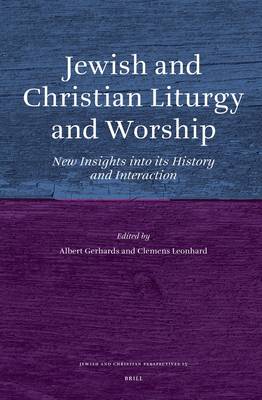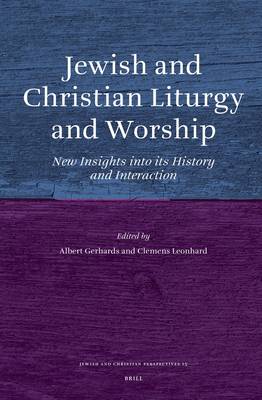
- Afhalen na 1 uur in een winkel met voorraad
- Gratis thuislevering in België vanaf € 30
- Ruim aanbod met 7 miljoen producten
- Afhalen na 1 uur in een winkel met voorraad
- Gratis thuislevering in België vanaf € 30
- Ruim aanbod met 7 miljoen producten
Zoeken
Jewish and Christian Liturgy and Worship
New Insights Into Its History and Interaction
Albert Gerhards, Clemens Leonhard
€ 322,45
+ 644 punten
Omschrijving
Presenting new insights into the history and interaction between Jewish and Christian liturgy and worship, the various contributions offer a deeper understanding of the identity of Judaism and Christianity. It addresses issues such as:
- Is the Eucharistic Prayer a 'Berakha' and what information is available for the reconstruction of the history of the Jewish 'Grace after Meals'?
- How does Jewish liturgy rework the Bible, and are Christians and Jews using similar methods when they create liturgical poetry on the basis of a biblical text?
- Which texts of the Cairo Genizah are of direct importance for the history of Christian liturgies, and are Christian creeds in fact Prayers or Hymns?
- What does it mean that both Jews and Christians recite Isaiah's "Holy, Holy, Holy" at important points in their respective liturgies?
Questions like these brought together scholars and specialists from different disciplines to share their recent insights at a conference in Aachen, Germany, and to offer the reader a fascinating discourse on a broad range of aspects of Jewish and Christian liturgies.
- Is the Eucharistic Prayer a 'Berakha' and what information is available for the reconstruction of the history of the Jewish 'Grace after Meals'?
- How does Jewish liturgy rework the Bible, and are Christians and Jews using similar methods when they create liturgical poetry on the basis of a biblical text?
- Which texts of the Cairo Genizah are of direct importance for the history of Christian liturgies, and are Christian creeds in fact Prayers or Hymns?
- What does it mean that both Jews and Christians recite Isaiah's "Holy, Holy, Holy" at important points in their respective liturgies?
Questions like these brought together scholars and specialists from different disciplines to share their recent insights at a conference in Aachen, Germany, and to offer the reader a fascinating discourse on a broad range of aspects of Jewish and Christian liturgies.
Specificaties
Betrokkenen
- Auteur(s):
- Uitgeverij:
Inhoud
- Aantal bladzijden:
- 344
- Taal:
- Engels
- Reeks:
- Reeksnummer:
- nr. 15
Eigenschappen
- Productcode (EAN):
- 9789004162013
- Verschijningsdatum:
- 31/10/2007
- Uitvoering:
- Hardcover
- Formaat:
- Genaaid
- Afmetingen:
- 168 mm x 245 mm
- Gewicht:
- 766 g

Alleen bij Standaard Boekhandel
+ 644 punten op je klantenkaart van Standaard Boekhandel
Beoordelingen
We publiceren alleen reviews die voldoen aan de voorwaarden voor reviews. Bekijk onze voorwaarden voor reviews.








